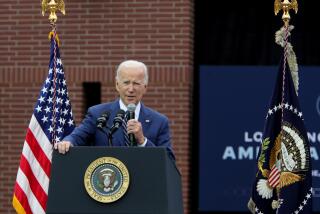Thanks but, No, Thanks to Philip Morris’ Offer
- Share via
Philip Morris USA wants to cut a deal. The nation’s largest cigarette maker says it’s ready to support legislation to ban vending machine sales of all tobacco products and to accept some limits on cigarette advertising aimed at young people. In exchange it wants Congress to prevent the Food and Drug Administration from regulating tobacco products, ever.
Last year the FDA identified cigarettes as a drug-delivery system, the drug being nicotine, whose addictive properties keep smokers coming back for more. The FDA is now preparing a “final proposed rule” on tobacco that will do the cigarette industry no favors. It’s this prospect that has given rise to Philip Morris’ proposal to strike a bargain.
But the offer is not even worth serious discussion. Cigarette smoking over time sickens and kills people, contributing to half a million deaths a year in the United States. It is the nation’s foremost controllable public health danger. Taking the strongest possible action to limit smoking’s malign effects, and especially to try to dissuade young people from smoking, is a public policy imperative on which compromise is out of the question.
This isn’t to say that Philip Morris’ proposal wholly lacks merit. The FDA, for example, wants to ban tobacco billboard ads within 1,000 feet of schools and playgrounds. Philip Morris would go further by limiting all billboard ads to a text-only format in black and white. In other words, no seductive models or lush tropical scenery hinting that smoking is a concomitant of easy living or a route to sexual gratification.
The cigarette manufacturer would also ban smoking ads on public transit and use of cigarette names in promotional giveaways of items such as T-shirts or caps. All these useful ideas deserve to be part of the FDA’s final proposed rule.
In making its offer to accept tighter restrictions, Philip Morris is not simply trying to head off regulations whose effects on its business would probably be far more severe. It is implicitly acknowledging the validity of key points that critics of the cigarette industry have long made. One is that young people are in fact a particular target of cigarette advertising, for the obvious reason that new smokers must constantly be recruited to replace those who each year win the struggle to quit smoking or perhaps die from diseases caused or exacerbated by their addiction. Further, it is acknowledging that, yes, smoking is bad for the health of young people, which of course means it’s bad for older people as well. If the industry felt otherwise, if it could refute the overwhelming evidence that smoking has devastating effects, it would fight to the last ditch all efforts to control sales and advertising of its products.
Even tobacco’s strongest congressional supporters concede that the Philip Morris proposals stand no chance of winning approval in the Senate. The real battle will come over the FDA’s multi-part rule. The final proposed rule should be as tough as the nation’s tobacco-related public health problem warrants. Which is to say very tough indeed.
More to Read
Inside the business of entertainment
The Wide Shot brings you news, analysis and insights on everything from streaming wars to production — and what it all means for the future.
You may occasionally receive promotional content from the Los Angeles Times.










